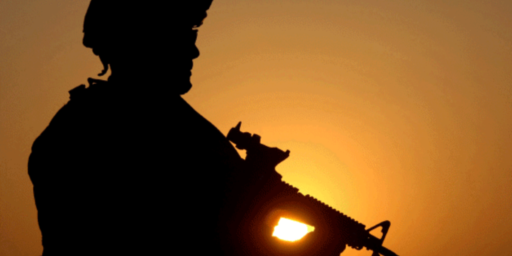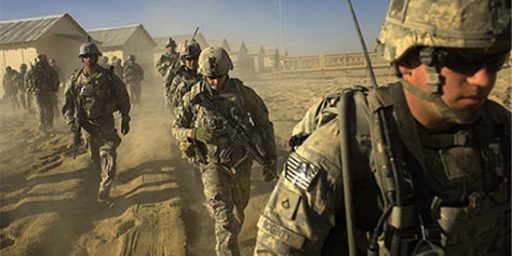Army Suicide Rate and Random Variation
The Army’s suicide rate for 2006 is the highest in a generation. While this sounds alarming, and will naturally be attributed to the stresses of an ongoing war, the chances are quite good that this is mere random variation in a low frequency event.
Army soldiers committed suicide last year at the highest rate in 26 years, and more than a quarter did so while serving in Iraq and Afghanistan, according to a new military report. The report, obtained by The Associated Press ahead of its scheduled release Thursday, found there were 99 confirmed suicides among active duty soldiers during 2006, up from 88 the previous year and the highest number since the 102 suicides in 1991 at the time of the Persian Gulf War.
The suicide rate for the Army has fluctuated over the past 26 years, from last year’s high of 17.3 per 100,000 to a low of 9.1 per 100,000 in 2001.
[…]
Failed personal relationships, legal and financial problems and the stress of their jobs were factors motivating the soldiers to commit suicide, according to the report.
“In addition, there was a significant relationship between suicide attempts and number of days deployed” in Iraq, Afghanistan or nearby countries where troops are participating in the war effort, it said. The same pattern seemed to hold true for those who not only attempted, but succeeded in killing themselves.
Marc Danziger, whose son has recently enlisted in the military, has done some calculations and found that the Army suicide rate, even at this peak, is actually lower than for their civilian cohorts. That’s interesting indeed and speaks to the Army’s vetting process and support system.
Still, the fact that the Army is experiencing a spike in suicides, which seems correlated with deployments to war zones, is naturally disturbing. And it leads Jeralyn Merritt to serve up the Democratic Talking Point of the Day: “I blame President Bush. Every day he keeps our soldiers in this war, more of them are going to die.”
It’s true, of course, that soldiers die in wars. And not simply from combat action but from the added stress, including the effects the deployment has on their personal lives.
When I heard this story on NPR this morning as I was awakening, my initial reaction was that it’s not surprising that it’s been 26 years since the numbers were this high, since that was the last time the Army was engaged in a sustained war. But, of course, my groggy math was off by a decade: 26 years ago from 2006 is 1980, the last year of the Carter administration and a full seven years after our departure from Vietnam. Which means that, despite legitimate concern about suicides rising during this war (see here and here for stories from 2003), the rate was actually lower than it was during the peacetime Army of 1980.
During the intervening period, the high has been 17.3 per 100,000 and the low 9.1 per 100,000. It’s not only conceivable but probable that the fluctuation is essentially random, having more to do with the vagaries of the personal lives of the soldiers than what the Army is doing.
We had more suicides in 1991, the year of the first Gulf War, than in 2006. Granted, that was in a significantly larger Army. Still, the combat stress level was much lower then than now, owing to the shorter deployment and the fact that the enemy was easily identifiable. For that matter, there was a 26% increase in active-duty suicides from 1997 to 1999, during the Clinton administration.
We had a spike of more than 11 percent from 2005 to 2006. That’s huge. But it represents 11 individual soldiers. The preliminary numbers indicate that the rate will likely decline for 2007. That’s despite a surge in the number of soldiers deployed to Iraq and an increase in the combat tempo. If that holds, it almost surely means that the 2006 spike is largely random variation in a complex phenomenon. It’s noteworthy, too, that a study of British Army suicides from 1980 to 2006 shows a decline in recent years which continued through its deployments to Iraq and Afghanistan.
Karen M. Eaton and colleagues observe in the April 2006 issue of The American Association of Suicidology,
[S]uicides are low frequency for research due to the large population events. Even in larger populations, small differences in the number of self-inflicted deaths over time, or between groups over a single interval, can result in wide fluctuations in rates.
Their study, entitled, “Strengthening the Validity of Population-Based Suicide Rate Comparisons: An Illustration Using U.S. Military and Civilian Data” further concluded that, “suicide rate fluctuations as large as 20—40% in any year may be attributed to random error.”
The question of whether we should withdraw troops from Iraq is largely independent of this issue. The main costs of the war borne by soldiers are combat deaths, combat injuries, lost family time, and related matters. Further, the general cost to the nation and how it relates to the benefits of continuing the fight and the probability of success must be weighed. Random variation in the suicide rates among soldiers, however, is a poor basis for determining the nation’s foreign policy.






Even if everything you wrote above were true or relevant or fair, this post would still be remarkable for its utter coldness of heart.
Good going, James. You’ve outdone yourself.
Yes, what this world needs is more emotionalism.
As someone who knows a little statistics, I can say there is no statistical significance to the increase from 88 to 99. If the expected number or ‘true average’ for the year was 94, the standard deviation from 94 would be +/- 9.7. This typical deviation from the expected value straddles the 2005 and 2006 totals. The jump would have to be 20 or more to suggest a real increase.
The troops that Bush and his ilk claim to support are real people, with real parents, real kids, real responsibilities. When they die, it very real. So maybe that is worth a bit of “emotionalism”.
Way to support the troops James, hope your morning coffee was not disturbed.
These people killed themselves in 2006. My learning the aggregate numbers three quarters of the way through 2007 and getting emotional about it doesn’t bring them back.
What I’m doing here is trying to analyze what the numbers actually tell us. The short answer is “Not much.” The aggregation of small numbers over the course of a year will produce statistical anomalies. People who study suicide for a living, who I’ve cited in the piece, agree.
No, but it might help to end this insane war, a war which you have supported. Guys like you and me live in nice houses and spend time in Tuscany (actually I prefer Paris).
Meanwhile, the troops who selflessly serve our country are dying in the brutal heat in Baghdad to give “breathing space” to a government that followed Bush’s example and WENT ON VACATION. Doesn’t that piss you off? I recommend a strong does of emotionalism.
As someone who knows a little statistics, I can say there is no statistical significance to the increase from 88 to 99.
Is there human significance? What I mean is, if you are a human being thinking as a human being as opposed to a robot thinking like a statistician, is it significant and meaningful that last year 88 soldiers killed themselves, and this year 99 soldiers killed themselves?
What is the suicide rate for the general population in the U.S? I’ll bet it is similar or more. just same old journalism. Don’t do the research just sensationalize.
Kathy, I find your cold, cruel calculation in trying to use these deaths to further a political agenda insultingly inhuman. DON’T try to twist these poor people’s deaths into something they are not. Such behavior is contemptible.
I find your cold, cruel calculation in trying to use these deaths to further a political agenda insultingly inhuman. DON’T try to twist these poor people’s deaths into something they are not. Such behavior is contemptible.
LOL, yes, Mr. Orwell. I take your point. Heaven save us from the callousness of pointing out that “these poor people’s deaths” are entirely their fault and do not reflect on the military at all. True compassion lies in blaming the men and women who have taken their own lives for their weakness and cowardice, absolving the military of all responsibility, and then forgetting about it as quickly as possible — which in your case is at about the speed of light.
CORRECTION: Heaven save us from the callousness of pointing out that “these poor people’s deaths” reflect badly on the institution that is supposed to be supporting them.
How so? The Army suicide rate remains, despite a grueling war, comparable to that among civilians of the same age and gender. That’s rather remarkable, no? The Army has all manner of counseling programs, formal and informal, in place and always has. And it has a very formalized suicide prevention program that goes back to the early 1990s.
Could we do more? Sure. The Walter Reed fiasco showed that.
But the fact that 11 more soldiers killed themselves in 2006 than in 2005 in a force of 1.43 million doesn’t prove institutional failure.
It’s evident that Anjin-San and Kathy have never had to make serious, critical decisions, particularly those of major consequence.
But the fact that 11 more soldiers killed themselves in 2006 than in 2005 in a force of 1.43 million doesn’t prove institutional failure.
Oh? Does it prove, then, institutional success?
Oh? Does it prove, then, institutional success?
No one has made that claim. Though, in reality a statistically insignificant change in the suicide rate, and a rate that is not different from the general populace is one indication of institutional success.
It proves THE GODS ARE ANGRY!!!!
That’s exactly the the sort of irrational, emotional, ‘OH MY GOD WE GOTTA’ DO SOMETHING!” reaction that, left unchecked in earlier times, led to human sacrifice, witch-burning, the Inquisition, and other wonderful examples of letting one’s FEELINGS rule the day.
One of the first things we taught aspiring EMTs was “Don’t just DO SOMETHING, stand there!” In other words, when dealing with serious matters, think carefully what the circumstances are really telling you before you undertake an action.
As a vet myself, I reject the idiotic notion that, because I don’t squeal and shriek, I don’t care. I went to my first military funerals at age 20, and it didn’t stop there. WIA and KIA are more than just numbers to me, but they are still numbers as well. They deserve serious consideration, not only hand-wringing and emotion.
So to any self-righteous *sshole who thinks he or she “cares” more than me just because I consider war and the military too serious to base policy on what feels good, let me ask them one question: I have a number of friends in Arlington, how about you ?
I care about them, but I don’t want to base foreign-policy completely on pain-avoidance. A small child pulls the covers up over his head, convinced that if he cannot see the scary monster, the scary monster can’t see him. A small child hides in the closet during a fire, lacking the understanding that some dangers are far worse when not faced promptly and rationally. A small child runs away from a fight, convinced that avoiding a black eye today is worth getting pummelled again tomorrow.
An adult say “This is gonna’ suck, but I might as well get it over with. It ain’t gonna’ suck any less tomorrow.”
Sacrifice and delay of gratification are adult traits. Letting emotions rule the day is not.
And the danger in “news” like this is having only an emotional response. If an undesirable trend forms (by no means proven), let’s consider what can be done. But it needs to fall somewhat short of calling for withdrawal because 11 PFC Snarglepuss’s killed themselves.
Perhaps we should just make Basic Training harder ? That might weed out more folks likely to kill themselves ? Okay, that was a flippant response, not a serious one, but if the desired outcome is “reduce the rate of suicides,” it might work.
Personally, I think that pulling out of Iraq without success would increase the despair and thus the overall suicide rates among the military for several years to come. Imagine if we’d pulled out of Europe in WW II at the Battle of the Bulge ?
/Sarcasm on.
Nothing like being told “Ehhh, all your sacrifices were for nothing. Your buddies died for nothing. It was all a mistake.” to pump up the morale and make suicide less likely.
/Sarcasm off.
No, but it might help to end this insane war, a war which you have supported. Guys like you and me live in nice houses and spend time in Tuscany (actually I prefer Paris).
So let me get this straight… detractors of this post are simultaneously (though not the same people) saying “think of the humanity of these individual lives!” and then saying “let’s use them for our gain [to end the war].”
I think it comes down to figuring out what your goals are. I think it’s disingenuous for your goal to be (Stay/Leave) Iraq and use these stats to further your cause. Everybody here agrees suicide isn’t something we want to happen in any sector of society, so the goal should be less suicide. You can’t logically make the conclusion “end the war, less suicide” at this point.
Sure you can’t discount the humanity of the situation, but having feelings about it often only hinders one from finding solutions from numbers.
A very sad thing this is, but for the liberals just another tool to blame with, go figure.
The Democrat party?